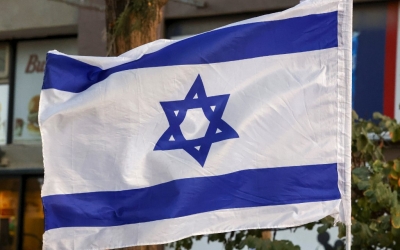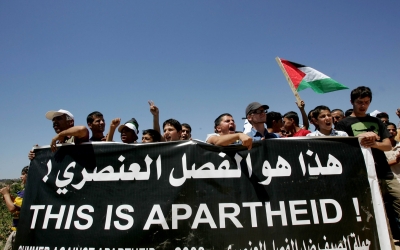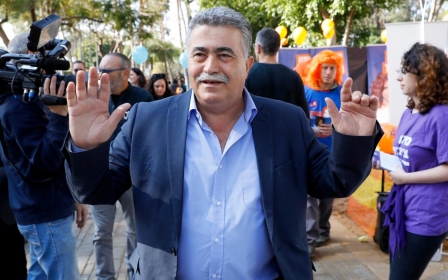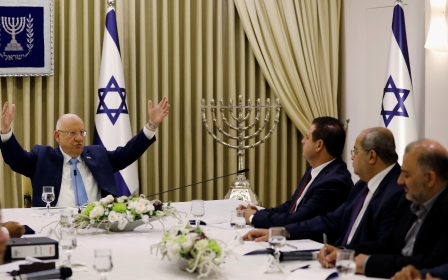Israeli politicians trying new Arab-Jewish partnerships in bid for success
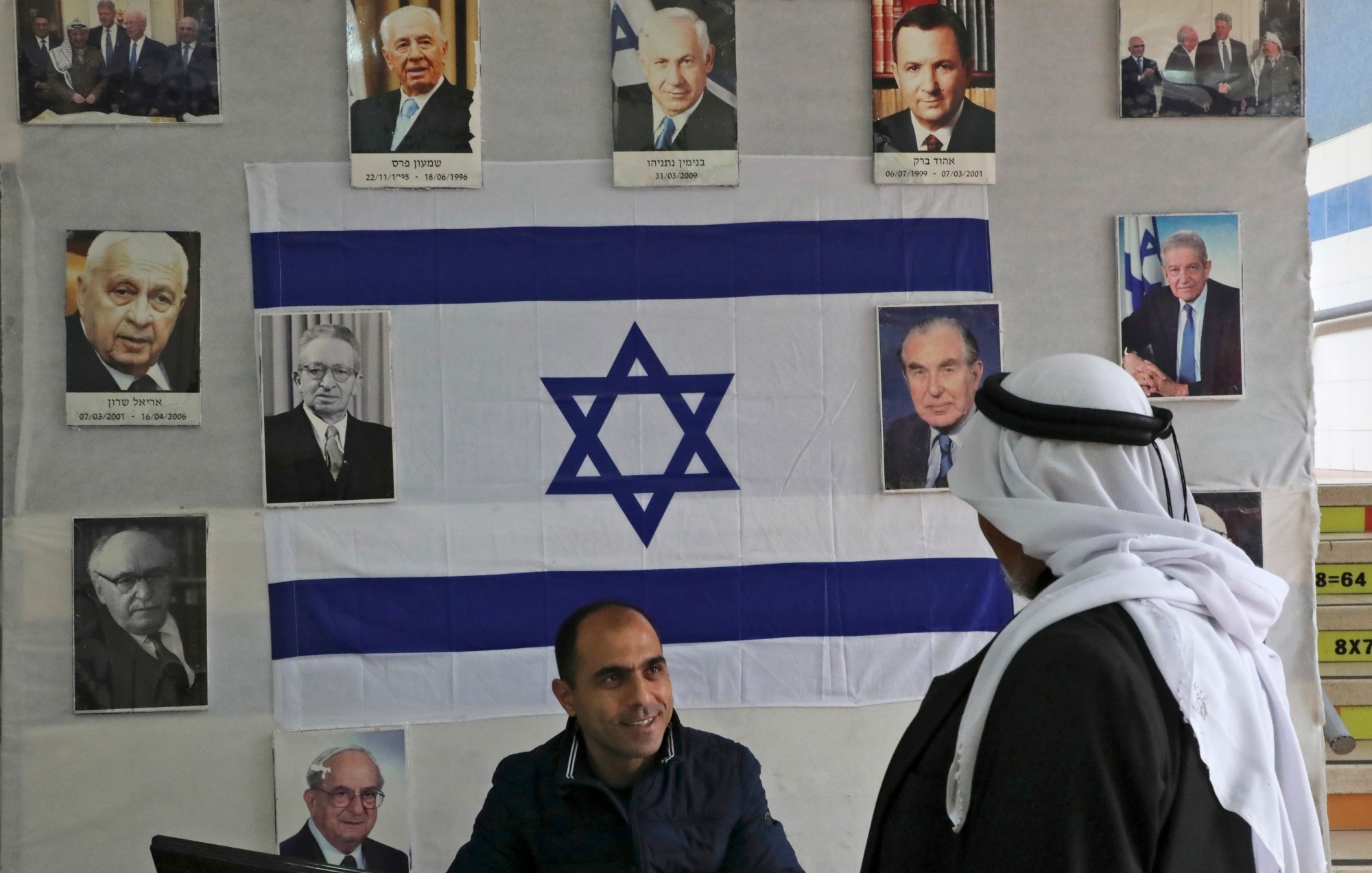
With a fourth round of elections in Israel in the span of just two years on the horizon, the latest political fad, so to speak, is building alliances between Jewish-Israeli politicians and representatives from the Palestinian community in Israel.
Three initiatives, all at different stages of realisation, are competing against one another and the ticking political clock, with Prime Minister Benjamin Netanyahu, facing multiple corruption cases, waiting to decide when is best for him to drag Israelis to the polls.
New MEE newsletter: Jerusalem Dispatch
Sign up to get the latest insights and analysis on Israel-Palestine, alongside Turkey Unpacked and other MEE newsletters
The very concept of Jewish-Palestinian political formations is based on a new perception of both communities, particularly that of Palestinian citizens of Israel (often referred to as Arab-Israelis) who, despite making up 20 percent of the country’s population, have generally been ignored as a voting force by mainstream Israel parties.
Not only are these political figures considering alliances due to electoral interdependence, they are doing so because the occupation, which remains the major cause of disagreement between Palestinian and Jewish-Israeli factions, has dropped below Israel's internal agenda as the defining issue of the moment.
Nevertheless, obstacles remain for these partnerships to get off the ground in time for the next elections.
Changing perceptions
Three different explanations can be offered to explain this new phenomenon.
First, the Israeli political scene - on the left - has collectively adopted a phrase coined by Ayman Odeh, head of the Joint List, a coalition of parties representing Palestinian citizens in the Knesset, Israel’s parliament.
In September 2019, he wrote in the New York Times: “Arab Palestinian citizens [of Israel] cannot change the course of Israel alone, but change is impossible without us.”
Secondly, there is speculation about if Israeli society, at least from centre to the left, whether Jews or Palestinians, has finally matured enough to form a real partnership for the common good.
Last and not least, the shrinking Jewish-Israeli left is running out of Jewish supporters and is in desperate need of spare parts - meaning Palestinian citizens - as political partners and voters.
For Avraham Burg, former Labor MP and current Hadash member, the emergence of political initiatives seeking to bridge the divide can in part be explained by “Bibi fatigue” - using the nickname for the legally embattled prime minister - as well as the Jewish-Israeli left’s dwindling support base.
“The Jewish centre-left realised that if they wanted to regain power, they couldn’t rely on 105 Jewish members of parliament - they needed all 120,” he told Middle East Eye.
The truth is probably a combination of all three hypotheses. Both Jewish and Palestinian societies in Israel are undergoing major changes in all possible and, at times, conflicting directions, and the need for partnerships is just one of them.
The desperation of the Jewish left is certainly a catalyst for this unprecedented openness. Odeh’s formula still resonates in both communities - though if these words are translated into deeds in the form of a new party, it will happen without him.
In recent meetings and private conversations, he presents a different set of priorities: to fix his struggling Joint List, prepare the ground in his own community and conduct a lengthy and detailed dialogue with Jewish-Israeli partners, presenting a litany of demands many will find difficult to accept - such as the right of return for Palestinian refugees or a change in position regarding Syria.
Odeh has even sarcastically referred to his Jewish suitors’ urgency to reach the “promised land” of parliament long before he finds it feasible.
Low-key initiatives on the left
Most of the new party building is still very much low-key. The one initiative openly presented has been the new partnership between Ali Salam, the mayor of Nazareth, with former mayor of Haifa, Yona Yahav.
In an interview with Knesset TV channel, Salam called upon the representatives of the Joint List to join him. Excluded from Salam’s invitation, however, are Odeh and his Hadash party, as there is a lot of bad blood between the two. “Odeh is too great for us, we are not at his level,” Salam said sarcastically.
Yahav is harder to pin down - but in an interview to Israel’s Radio North on 28 October, he defined himself as “the most popular Jew in the Arab community”. The validity of this statement has never been proven.
Referring to the initiative itself, he said, “It is still a secret”. It is not.
Meretz, the small Zionist-leftist party, has an even more confusing position on the issue. A Jewish-Palestinian partnership has been discussed within Meretz for years - meaning, essentially, a partnership with Odeh.
But Odeh’s reluctance is not the only reason why the party is revisiting its agenda of looking for a new cohort of voters and Arab-Israeli partners.
A survey conducted by the party may have put an end to the partnership track: only 0.7 percent of centre-left respondents said that they would certainly vote for a Jewish-Palestinian party. Senior Meretz members believe this small percentage does not justify such a drastic change in the nature of the party and might, in fact, scare off the Jewish supporters who define themselves as Zionists.
The debate within Meretz is however far from over. Senior members like executive board chairman Uri Zaki, still hold on to the concept of a Jewish-Palestinian Israeli party.
“I suggest a Jewish-Arab focus, which include language issues and of course leadership,” Zaki told MEE.
Meanwhile, the most prominent Jewish-Arab political partnership within Israel so far is the one between Netanyahu and Knesset member Mansour Abbas, who heads the Islamic Movement-Southern Branch in the Negev, in a rift from the Joint List.
The mutual courtship between the premier, who has referred to Arab-Israeli representatives in the Knesset as “enemies of the state”, and the MP has turned Abbas into a frequent guest of TV studios including the far-right Channel 20.
Abbas himself has defined this relationship as one of “mutual exploitation” in the positive sense, according to him.
Finding a common political agenda
One of the oft-discussed points regarding these new partnerships is the seeming change in political priorities among Palestinian citizens of Israel.
According to a poll published by the Konrad Adenauer Foundation and Tel Aviv University on 6 December, among 500 Palestinian citizens of Israel, almost 65 percent of respondents supported the idea of an Arab-Jewish party.
Some 52 percent of respondents perceived violence within Palestinian society in Israel as an issue of utmost concern. Only 2.7 percent of those polled saw a political solution to the Israeli occupation as the most important issue on their agenda.
Meanwhile, 45 percent said they were dissatisfied with the performance of the Joint List, while over 20 percent said they believed a new party would strengthen the influence of Palestinian citizens of Israel in the political sphere.
Interestingly, in another survey published by the Israel Democracy Institute on Monday, 43 percent of Jewish respondents said they opposed the Netanyahu-Abbas partnership, with only 29 percent in favour, while of those surveyed, 41 percent of Palestinian citizens of Israel said they supported it.
No one can say if the results of these polls reflect a temporary mood or a profound transformation. One way or another, they cannot be ignored.
Those involved in the efforts to create these Jewish-Palestinian joint parties rely on similar surveys and the changing climate. If upcoming elections are postponed to June 2021, at least one of the new projects might be ready to join the race.
Outside of the odd Netanyahu-Abbas pairing, the most advanced of all such initiatives is known as Brith, meaning “covenant” or “alliance” in Hebrew, and “tahaaluf” in Arabic.
Everything said and done by this new group, which includes a number of prominent Meretz members, is now articulated in both languages – starting with its carefully crafted manifesto paying tribute not only to overused words like “equality” and “justice”, but also referring to the twofold history of the two peoples: Israel’s independence and the Nakba, the need for a just division of resources, and the repeal of the 2018 Jewish Nation State law, among others.
Burg, who is one of the leading figures in Brith, has come a long way from his days as speaker of the Knesset between 1999 and 2003, and former head of the World Zionist Organisation. In 2015, when he announced that he had joined Odeh’s Hadash party, his decision to reject Zionism and join a party from the Arab Joint List shocked many Israelis.
'Both Jewish and Arab politics are a generation behind everyday reality'
- Avraham Burg, a leader of the Brith initiative
“There is no such thing as a Zionist left,” Burg told MEE. “It is an invention of those who define themselves as such.
“In fact, ‘left’ and ‘Zionism’ cannot be reconciled. It served a purpose for a time... It was easy to use the Israeli-Palestinian conflict to stick to old definitions,” he added. “I claim that ‘Zionist left’ is an artificial identity, a cover-up for a comfort zone. Those who still define themselves as ‘Zionist left’ are still organised around ethnic definitions. No one there is in a hurry to give up on the privileges of an ethnic majority.”
For a partnership to be effective, Burg says its Jewish-Israeli participants “need to cross two Rubicons: the mental one, which has perpetuated since 1948 the exclusion of Arab Israelis, and the practical one – how to find a common denominator,” he noted. “We live in a kind of absurdity: there is much more shared space [between Palestinian and Jewish citizens of Israel] in ‘real life’ than in the political sphere, which is hostile to this shared space.
“Both Jewish and Arab politics are a generation behind everyday reality.”
While Burg acknowledged that “there was some grain of truth” in the view that some left-wing parties might have seen Palestinian voters as convenient “spare parts”, he maintained that initiatives such as Brith “are there for real partnership”.
“We’ve reached an agreement over 80 percent of the issues,” he said. “The remaining 20 percent – to be continued.”
When asked what political stances Brith had adopted, particularly regarding the occupation of Palestinian territories, Burg said, “The very threshold to join our activity is the recognition that we all want to end the conflict with respect.”
“The end of the occupation is certainly a precondition, but it is not the only one,” he added.
Another question that remains to be determined is who might lead Brith and other similar initiatives. Burg said he believed joint leadership should be the formula, with the leaders being “the Arab who can bring in the most votes from the Jews and the Jew who can bring the most votes from the Arabs”.
One of the names often mentioned as the likely Palestinian candidate to lead the Brith – if and when the group gets off the ground fully – is Mohammad Darawshe, the director of the Center for a Shared Society at Givat Haviva.
But when speaking to MEE, Darawshe did not refer to his own candidacy, stating instead: “I am fully dedicated to this project and hope we manage to get organised and raise the necessary financing on time.”
Amid Israeli political and social turmoil, prophesying is a risky profession.
Middle East Eye delivers independent and unrivalled coverage and analysis of the Middle East, North Africa and beyond. To learn more about republishing this content and the associated fees, please fill out this form. More about MEE can be found here.


